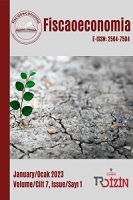Kurumsal Faktörler ve Dışa Açıklık İlişkisi: MINT Ülkeleri Örneği
Institutional Factors and Trade Openness: MINT Countries
Author(s): Zehra Doğan Çalışkan, Yalçın ELMASSubject(s): National Economy, Supranational / Global Economy, Business Economy / Management, Economic policy, Socio-Economic Research
Published by: Ahmet Arif Eren
Keywords: Export; Trade Openness; Institutional Economics; ARDL;
Summary/Abstract: Institutional factors as the determinant of economic processes also shape international trade. Countries’ economic habits of life and their economic decision-making process with their bureaucratic decision-making processes that regulate those habits and processes will influence international trade in all aspects. In this regard, this study’s primary point is on what will be the institutional variables’ impact on international trade. Accountability, political stability, government activities, qualities of regulations, the rule of law, and control of corruption from Worldwide Governance Indicators (WGI) of the World Bank are selected as these institutional variables. The relationship between these variables that affect economic life and export, which is expressed as openness, rates in national income are studied, specific to MINT countries (Mexico, Indonesia, Nigeria, and Turkey), to estimate by utilizing the ARDL method. As a result of the study, our hypothesis that argues that improvements (deteriorations) in governance indicators will affect exports positively (negatively) cannot be confirmed according to our discoveries. Qualities of regulations variable’s long-term parameters are the only ones deemed to fit within the theoretical framework. The study only discovered similar results with some of the studies in the contemporary literature in its current state. When qualities of regulations increase, in other words when economic interventions improve, openness will increase.
Journal: Fiscaoeconomia
- Issue Year: 7/2023
- Issue No: 1
- Page Range: 938-954
- Page Count: 17
- Language: Turkish

